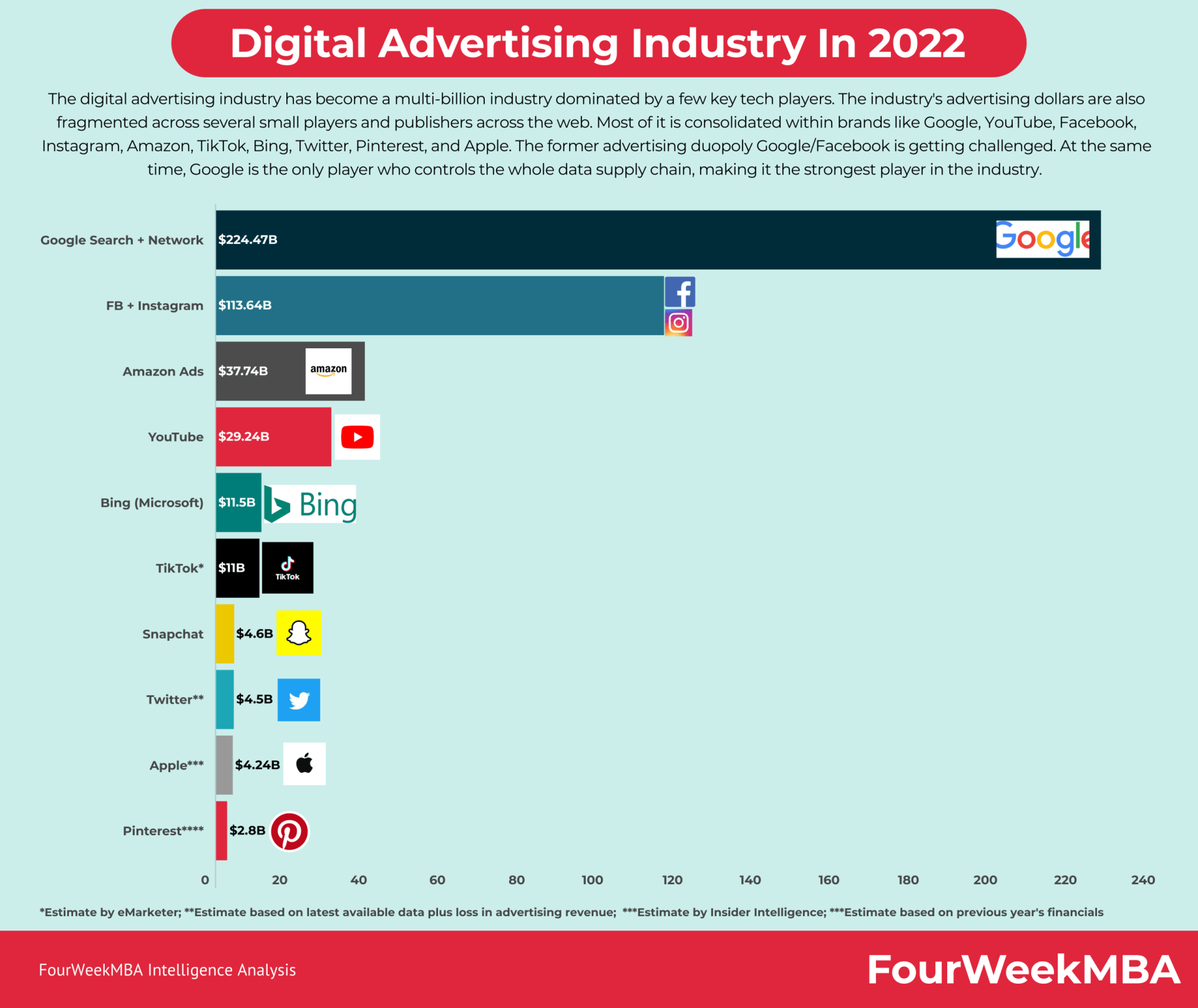According to gs.statcounter.com, Google holds a 92% market share of the search industry worldwide. If we look at the digital advertising landscape, competition is heating up as existing, and new entrants are growing their digital advertising footprint (TikTok, Amazon, and Apple in particular).
How do you assess a monopoly?

A monopoly is a situation in which one player controls the whole market in a particular industry.
That means the monopolist can prevent competition as it can charge high prices without losing market shares.
Or it can leverage its market dominance to prevent others from entering the market.
Assessing whether Google is a monopoly is a matter of perspective!
There are various methodologies to assess whether a company holds a monopoly in an industry.
Concentration Ratio
That is represented by how much of the sales are controlled by the largest group.
In short, it looks at the concentration of revenues of a company in a market.
From that perspective, Google is definitely the largest player in the digital advertising industry.
Yet, until a few years back, Google and Facebook held a monopoly when it came to digital advertising.
Today, companies start to have a few more options.
New players like TikTok, Apple, Amazon, and Linkedin too, are becoming good alternatives.
Profit-Rate as a Measure
The profit rate looks at how high are the profits of the monopolist.
High profits mean the ability of the monopolist to attract high profits without the risk of new entrants into the market.
If we look at that, from this perspective, Google has very wide profit margins.

Lerner’s Measure
The formula used in this case is (P-MC) / P.
Where MC is the marginal cost.
According to this view, in a situation of perfect competition, the price charges are equal or close to MC so that the result would be zero, thus no monopoly.
Where MC becomes 0, then the effect becomes 1. In this scenario, you have a monopoly.
For the sake of simplicity, we’ll look at the net market share of Google in the search industry and the market share in the industry that allows Google to pay the bills: the digital advertising industry.
Google monopolized the search industry but is the digital advertising industry monopolized?
If you look at the search industry, Google monopolized the market.
It doesn’t matter from which perspective you look.
According to gs.statcounter.com, Google retains more than 92% of the worldwide search market share.
You should not be surprised, as Google has been keeping a dominant position for a long time.
However, even though Google is a search engine, it monetizes through a hidden revenue business model based on advertising.
So what about that?
Google and Facebook: the duopoly of the digital advertising industry, still?
If we change our perspective and look at the advertising industry, it’s hard to believe that Google is a monopoly.
However, in the digital advertising industry, Google and Facebook combined have a dominant position.
Yet, this duopoly is quickly getting eroded by other players, which have enough resources to compete.
Understanding market dominance can be a matter of perspectives
We’ve seen how assessing a monopoly can be a matter of perspective. If we look at the search industry market share, Google is a monopolist.
However, if we look solely at the digital advertising industry, Google and Facebook control the market (for now)!
Yet, if we look at the search market shares, perhaps in the US, we can appreciate how much domination Google has over that market.

Key Highlights:
- Google’s Dominance: Google holds a remarkable 92% market share in the global search industry, making it the undisputed leader in search engine usage.
- Monopoly Defined: A monopoly is characterized by a single dominant entity that controls an industry, often resulting in the ability to set high prices and inhibit competition.
- Assessing Google’s Monopoly:
- Concentration Ratio: Concentration ratio assesses how much of a market’s sales are controlled by the largest player. Google is undoubtedly the biggest player in the digital advertising industry.
- Profit-Rate: High-profit margins indicate a monopolistic position, and Google maintains substantial profit margins.
- Lerner’s Measure: This measure examines the pricing behavior of a firm. In the search industry, Google unquestionably monopolizes the market.
- Digital Advertising Duopoly: Google, along with Facebook, has traditionally dominated the digital advertising industry. However, this duopoly is facing increasing competition from players like TikTok, Apple, Amazon, and LinkedIn.
- Market Dominance Perspectives: Assessing market dominance can vary depending on the perspective taken. Google is a clear monopolist in the search industry but faces a more competitive landscape in the digital advertising sector.
- Erosion of Duopoly: While Google and Facebook have held a duopoly in digital advertising, the emergence of well-resourced competitors is gradually eroding their dominance.
- Complex Evaluation: Evaluating whether Google is a monopoly involves considering market shares, profit rates, and competitive dynamics, highlighting that market dominance can be a multifaceted and evolving concept.
Related To Google






Google Traffic Acquisition Costs










Main Free Guides:
- Business Models
- Business Competition
- Business Strategy
- Business Development
- Digital Business Models
- Distribution Channels
- Marketing Strategy
- Organizational Structure
- Platform Business Models
- Revenue Models
- Tech Business Models
- Blockchain Business Models Framework
Read next:










